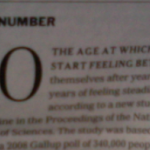Mathematics
A few weeks ago I spent a day at the Virginia Home Educators Convention in Richmond. These are the religious home schoolers we are talking about, meaning creationism was very well-represented indeed. Ken Ham gave several keynote talks. Yay!
I never got around to doing a proper write-up of the conference, but I do want to tell you about one of the talks I attended. It was called “Math From a Biblical Worldview?” Indeed, it was when I saw this talk advertised in the program that I knew I had to attend.
The speaker was Katherine Loop, author of a number of math education resources for home…
In my last math post I casually mentioned that the sum of the reciprocals of the primes diverges. That is
\[
\frac{1}{2}+\frac{1}{3}+\frac{1}{5}+\frac{1}{7}+\frac{1}{11}+\frac{1}{13}+ \dots=\infty
\]
That seems like a hard thing to prove. Certainly none of the traditional convergence tests from Calculus II will get the job done. The problem is how to “get at” the primes. Plainly we need to do something clever.
As it happens, the proof is a bit tricky. It has a lot of ingredients, too. On the other hand, each one of those ingredients is pretty interesting in its own right. So…
Once again, some are making a big deal out of the second derivative, just as was done with unemployment numbers (Got Green Shoots?), when they shouldn't. Consider this from an NY Times article about defense spending increases:
Mr. Gates is arguing that if the Pentagon budget is allowed to keep growing by 1 percent a year, he can find 2 percent or 3 percent in savings in the department's bureaucracy to reinvest in the military -- and that will be sufficient money to meet national security needs. In one of the paradoxes of Washington budget battles, Mr. Gates, even as he tries to forestall…
Since I'm at a Human Microbiome Project meeting, and don't have time to write, I thought this post from the archives of Mad Biologist was appropriate:
A while ago, I talked about some things biologists should learn, and the glaring omission was mathematical fluency. I bring this up because one of the things the Mad Biologist does is work on the Human Microbiome Project (between that, and fighting evil, we are very busy...). The part of the Human Microbiome Project ('HMP') that I'm involved with is a consortium of four sequencing centers and an informatics center, whose goal is to sequence…
Blake Stacey directed me towards a terrific tool for embedding TeX code into a web page. So how about we do ourselves a math post!
Remember the harmonic series? No doubt you encountered it in some calculus class or other. It's the one that goes like this:
$$
1+\frac{1}{2}+\frac{1}{3}+\frac{1}{4}+\frac{1}{5}+\frac{1}{6}+\dots
$$
The series is divergent. If you keep adding more and more of the terms your running tally will just get bigger and bigger forever.
There are many ways to show that it is divergent. If you remember your calculus then you know there is a little gadget…
The title of John Tierney's recent column in the New York Times, "Daring to Discuss Women's Potential in Science", suggests that Tierney thinks there's something dangerous about even raising the subject:
The House of Representatives has passed what I like to think of as Larry's Law. The official title of this legislation is "Fulfilling the potential of women in academic science and engineering," but nothing did more to empower its advocates than the controversy over a speech by Lawrence H. Summers when he was president of Harvard.
This proposed law, if passed by the Senate, would require the…
Yes, dear Gray Lady, you certainly sound more sophisticated when you use the word "prime number" in your newspaper. But perhaps you might want to look up the actual meaning of the word before placing those words prominently beside two times five times five.
Martin Gardner has died at the age of 95. He was a prolific writer in three different areas: mathematics, magic and debunking pseudoscience. Since those happen to be three of my favorite things in life you can imagine how big a fan I was of his writing. His book Puzzles From Other Worlds made a big impression on me when I stumbled onto a copy when I was about ten. It was a great thrill for me when Gardner volunteered to write a jacket endorsement for my book on the Monty Hall problem.
Obituaries are available all over the internet, but I think this profile, published in 1995 in Scientific…
Martin Gardner has passed away at age 95. I fondly remember going back through the back issues of "Scientific American" as a kid and devouring Gardner's "Mathematical Recreations" column (along with the similar columns written by Hofstadter and Dewdney.) If I have any mathematical skills, I probably owe a large chunk of them to some of Gardner's puzzles. Indeed, in my mind, Scientific American went from a pretty good first rate science magazine, to something less than stellar, when they ended these regular columns along with their "Amateur Scientist" column. (And don't get me started on…
What are stars?
Despite their ubiquity in our universe, their praises often go unsung. A friend admitted to me once that he hadn't realized -- you know, really viscerally realized -- that our sun was itself a star until he was in his twenties. From that moment forward, however, every glance at the night sky bowled him over with such an emotion of vast familiarity that he could hardly stand to look at it. And with just cause: every star, like our sun, is a wonder, a factory producing almost all the heavy elements floating around the cosmos -- including the everyday matter that makes up the…
One of the things that never ceases to amaze me is that our entire political class (both politicians and the mandarin hangers-on) still does not comprehend that the balance of accounts must sum to zero. That is, aggregate savings (all the stuff private entities, from corporations to individuals to non-profits, own) require government deficits (one way around this is trade surpluses, but we try to deal with the real world around here). It is impossible for the government and the entire private sector to both run surpluses. This isn't political theory or ideology, it's arithmetic.
So when…
Clive Thompson nails it when he describes the importance of statistical thinking (italics original; boldtype mine):
Statistics is hard. But that's not just an issue of individual understanding; it's also becoming one of the nation's biggest political problems. We live in a world where the thorniest policy issues increasingly boil down to arguments over what the data mean. If you don't understand statistics, you don't know what's going on -- and you can't tell when you're being lied to. Statistics should now be a core part of general education. You shouldn't finish high school without…
Setting nerdy hearts a-flutter across the internet is current rumour that Zooey Deschanel will play Ada Lovelace in an upcoming film about the world's first programmer.
Gizmodo has the scoop:
The casting of Zooey Deschanel isn't completely confirmed, with Production Weekly tweeting she's "in talks to play Ada Lovelace in "Enchantress Of Numbers," Bruce Beresford plans to direct the period drama this fall"
Which is as good an excuse as any to take a few minutes and bask in the sublime wonder of this video:
Hat tip: @carmenego
I learned something new the other day while preparing for my History of Math class. And since I have not done a math post in a while, I thought I would tell you about it. Specifically, I learned a new, and very clever, method for proving Fermat's Little Theorem.
Fermat's Little Theorem is a classic result from elementary number theory, first stated by Fermat but first proved by Euler. It can be stated in a number of different ways, but here is the version most useful for what I am about to do:
Let k be a positive integer and let p be a prime number. Then kp - k is a multiple of p.
This…
This time from the Newsletter of the European Mathematical Society. The reviewer is Paulo Ventura Araujo, a mathematician at the University of Porto in Portugal. Interestingly, he notes at the start of the review that he had never heard of the Monty Hall problem prior to reading my book. Here are the final two paragraphs of the lengthy review:
The non-mathematical portions of the book, and even the least demanding mathematical portions, are very good reading and are suitable for a large non-specialist audience. In the cognitive chapter, for instance, we are made aware of two basic types…
Which is to say that the Big Monty Hall Book got a (mostly) favorable review from the London Mathematical Society. The reviewer was David Spiegelhalter, a statistician at the University of Cambridge.
I should admit that I don't generally use the Monty Hall problem with students, as I am not convinced anyone is enlightened by having it explained. But I have had fun teasing people with it, from my girlfriend 35 years ago, to a senior QC at a dinner. However, my first thought was: how can anyone write a whole book on this? Well, Jason Rosenhouse has, and it's surprisingly good.
Why…
Don't see this at very many math conferences:
This is from the Gathering for Gardner, which took place last week in Atlanta. That's Martin Gardner, who wrote the “Mathematical Games” column in Scientific American for thirty years. He also wrote prolifically about magic and psuedoscience. Or perhaps I should say “writes” since he is still producing new work at ninety-five.
I was honored to receive an invitation based on Gardner's endorsement of my book. I gave a short talk about the Monty Hall problem on the first day, which seemed to be well-received.
For me the highlight of the…
In the next day or two I will post a detailed account of my experiences at the Gathering for Gardner, which I can honestly say is one of the most enjoyable math conferences I have ever attended. In the meantime, you might enjoy this essay by Burkard Polster and Marty Ross. Polster is a mathematician at Monash University in Australia, and I had the pleasure of meeting him at the conference. His column has nuggets like this:
There may not be much left to argue, but argument continues regardless. For instance, there is the famous Oxford theologian Richard Swinburne. He fell in love with…
tags: nature, numbers, geometry, mathematics, Fibonacci sequence, Golden Ratio, Angle Ratio, Delaunay Triangulation, Voronoi Tessellations, filmmaking, animation, Cristobal Vila, Nature by Numbers, streaming video
In this beautiful video, "Nature by Numbers," filmmaker Cristobal Vila presents a series of animations illustrating various mathematic principles, beginning with a breathtaking animation of the Fibonacci Sequence before moving on to the Golden Ratio, the Angle Ratio, the Delaunay Triangulation and Voronoi Tessellations. The words are scary-sounding, but the math is beautiful and the…
I will be leaving for Atlanta, GA tomorrow to participate in the Ninth Gathering for Gardner. That's Martin Gardner, of course. I will be giving a short talk about the Monty Hall problem on Thursday morning, and then it will be three days of math, magic and other cool things. Gardner contributed a jacket endorsement to my Monty Hall book.
The evo/creo book continues to plod along. I have now crossed the 30,000 word mark. It's a bit stressful, one minute I think I have written something pretty good, the next I think it is career-ending crap. Whatever.
Hopefully I"ll get back to semi-…

